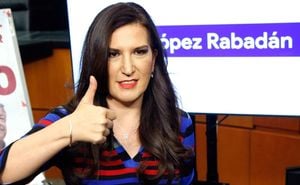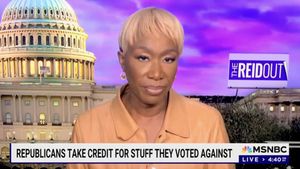During a recent press briefing at the White House, French President Emmanuel Macron made headlines by publicly correcting U.S. President Donald Trump over the financial contributions of European nations to Ukraine. This extraordinary moment came during their meeting on February 24, 2025, highlighting the tension between the two leaders amid their discussions about the war in Ukraine.
Trump, known for his controversial assertions, claimed, "Just so you understand, Europe is loaning the money to Ukraine. They're getting their money back." This statement, implying European support was merely transactional, provoked immediate pushback from Macron, who seized the opportunity to clarify the reality of the contributions made by European nations. "No, in fact, to be frank, we paid. We paid 60 percent of the total effort," Macron stated, reaching over to grab Trump's arm, signifying the urgent need to set the record straight.
The exchange garnered significant attention on social media, with many users praising Macron for his assertiveness and directly fact-checking the U.S. President. One observer remarked on social media, "Embarrassing picture for the US; Macron is fact-checking Trump. Can't Trump get his info straight?" While some hailed the moment as emblematic of Macron's willingness to confront inaccuracies, others criticized it as impolite, particularly for the host country.
The backdrop of the meeting was tense as France and the United States navigated different narratives about the financial contributions made toward Ukraine amid its conflict with Russia. Earlier discussions had established transatlantic tensions over how the two nations perceived their respective roles in supporting Ukraine’s defense. Macron's interjection served not only to fact-check Trump but to assert the reality of Germany and France's significant financial support efforts.
Observers noted this moment as symptomatic of the broader challenges facing NATO allies as they coordinate their response to the prolonged conflict. The divide between Trump’s narrative and Macron’s insistence on the facts emphasized the difficulty of forging unified strategies among European nations and the U.S. Moving past this incident, analysts suggest the comments also reflected longstanding frustrations within Europe about perceived discrepancies between U.S. and European contributions to Ukraine.
Beyond the immediate post-brief reactions, the dynamics of U.S.-European relations appeared strained but still cordial, with both leaders maintaining outwardly amicable dispositions. Earlier, Trump had expressed his frustrations during the bilateral meeting over what he termed “lackluster efforts” from European nations to engage more boldly on the Ukrainian front, hinting at greater expectations for solidarity among allies.
Switching focus back to the joint efforts for ending the war, conversations also turned toward the deployment of peacekeeping troops by European nations. Trump had indicated his openness to the idea of European involvement, making it clear he'd discussed such concepts with Russian President Vladimir Putin, stating, "Yeah, he will accept [peacekeeping troops]... Look, if we do this deal, he’s not looking for more war. He doesn’t mind," reinforcing the ambiguous stance he’s often taken on Russia.
This diplomatic meeting encapsulated the complex relationship between Trump and Macron, emphasizing their differences and similarities, amid efforts to stabilize conditions relating to Ukraine. The duality of their relationship—a mix of past camaraderie and current challenges—sets the stage for convoluted negotiations moving forward.
Macron’s emphasis on financial truths may have salvaged some integrity for the conversation, but it also illustrated the considerable communication barriers still present within their partnerships. Their meeting, marked by playful interactions yet underscored by conflicts, revealed the broader issues of accountability and collaborative strategies on global issues.
With Macron’s correction echoing throughout media channels, the diplomatic undertones signal an urgent need for American leaders to reconsider how they frame international partnerships and the responsibilities inherent within them. Macron’s direct engagement not only positioned him as someone willing to assert the European stance but also highlighted the necessity for transparent communication between allies.
The future remains uncertain as leaders across Europe and the U.S. navigate the intricacies of foreign policy toward Ukraine. The differing perceptions of aid contributions and military commitments, alongside Trump's unique approach to international diplomacy, reflect both the potential and the pitfalls traversing transatlantic ties. The ultimate goal remains unchanged: to advocate for sustainable peace and security for Ukraine, as raised expectations and tempered realities loom large over Western strategies.
Both leaders exited the meeting with cordial interactions, yet the conversations—marked by direct fact-checking and varied opinions—will resonate as they continue discusses how to engage with the current state of affairs impacting Ukraine. Through their continued dialogue, they face the challenge of reconciling their differences, potentially paving the way for cooperative solutions to the enduring conflict.



